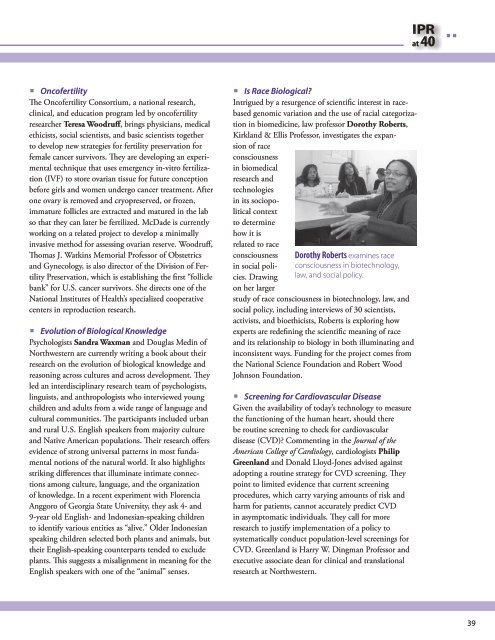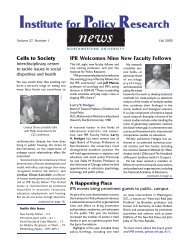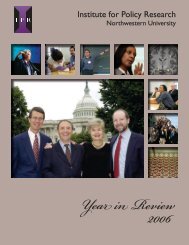IPR - Institute for Policy Research - Northwestern University
IPR - Institute for Policy Research - Northwestern University
IPR - Institute for Policy Research - Northwestern University
You also want an ePaper? Increase the reach of your titles
YUMPU automatically turns print PDFs into web optimized ePapers that Google loves.
<strong>IPR</strong><br />
at 40<br />
< Oncofertility<br />
The Oncofertility Consortium, a national research,<br />
clinical, and education program led by oncofertility<br />
researcher Teresa Woodruff, brings physicians, medical<br />
ethicists, social scientists, and basic scientists together<br />
to develop new strategies <strong>for</strong> fertility preservation <strong>for</strong><br />
female cancer survivors. They are developing an experimental<br />
technique that uses emergency in-vitro fertilization<br />
(IVF) to store ovarian tissue <strong>for</strong> future conception<br />
be<strong>for</strong>e girls and women undergo cancer treatment. After<br />
one ovary is removed and cryopreserved, or frozen,<br />
immature follicles are extracted and matured in the lab<br />
so that they can later be fertilized. McDade is currently<br />
working on a related project to develop a minimally<br />
invasive method <strong>for</strong> assessing ovarian reserve. Woodruff,<br />
Thomas J. Watkins Memorial Professor of Obstetrics<br />
and Gynecology, is also director of the Division of Fertility<br />
Preservation, which is establishing the first “follicle<br />
bank” <strong>for</strong> U.S. cancer survivors. She directs one of the<br />
National <strong>Institute</strong>s of Health’s specialized cooperative<br />
centers in reproduction research.<br />
< Evolution of Biological Knowledge<br />
Psychologists Sandra Waxman and Douglas Medin of<br />
<strong>Northwestern</strong> are currently writing a book about their<br />
research on the evolution of biological knowledge and<br />
reasoning across cultures and across development. They<br />
led an interdisciplinary research team of psychologists,<br />
linguists, and anthropologists who interviewed young<br />
children and adults from a wide range of language and<br />
cultural communities. The participants included urban<br />
and rural U.S. English speakers from majority culture<br />
and Native American populations. Their research offers<br />
evidence of strong universal patterns in most fundamental<br />
notions of the natural world. It also highlights<br />
striking differences that illuminate intimate connections<br />
among culture, language, and the organization<br />
of knowledge. In a recent experiment with Florencia<br />
Anggoro of Georgia State <strong>University</strong>, they ask 4- and<br />
9-year old English- and Indonesian-speaking children<br />
to identify various entities as “alive.” Older Indonesian<br />
speaking children selected both plants and animals, but<br />
their English-speaking counterparts tended to exclude<br />
plants. This suggests a misalignment in meaning <strong>for</strong> the<br />
English speakers with one of the ‘‘animal’’ senses.<br />
< Is Race Biological?<br />
Intrigued by a resurgence of scientific interest in racebased<br />
genomic variation and the use of racial categorization<br />
in biomedicine, law professor Dorothy Roberts,<br />
Kirkland & Ellis Professor, investigates the expansion<br />
of race<br />
consciousness<br />
in biomedical<br />
research and<br />
technologies<br />
in its sociopolitical<br />
context<br />
to determine<br />
how it is<br />
related to race<br />
consciousness<br />
in social policies.<br />
Drawing<br />
on her larger<br />
Dorothy Roberts examines race<br />
consciousness in biotechnology,<br />
law, and social policy.<br />
study of race consciousness in biotechnology, law, and<br />
social policy, including interviews of 30 scientists,<br />
activists, and bioethicists, Roberts is exploring how<br />
experts are redefining the scientific meaning of race<br />
and its relationship to biology in both illuminating and<br />
inconsistent ways. Funding <strong>for</strong> the project comes from<br />
the National Science Foundation and Robert Wood<br />
Johnson Foundation.<br />
< Screening <strong>for</strong> Cardiovascular Disease<br />
Given the availability of today’s technology to measure<br />
the functioning of the human heart, should there<br />
be routine screening to check <strong>for</strong> cardiovascular<br />
disease (CVD)? Commenting in the Journal of the<br />
American College of Cardiology, cardiologists Philip<br />
Greenland and Donald Lloyd-Jones advised against<br />
adopting a routine strategy <strong>for</strong> CVD screening. They<br />
point to limited evidence that current screening<br />
procedures, which carry varying amounts of risk and<br />
harm <strong>for</strong> patients, cannot accurately predict CVD<br />
in asymptomatic individuals. They call <strong>for</strong> more<br />
research to justify implementation of a policy to<br />
systematically conduct population-level screenings <strong>for</strong><br />
CVD. Greenland is Harry W. Dingman Professor and<br />
executive associate dean <strong>for</strong> clinical and translational<br />
research at <strong>Northwestern</strong>.<br />
39
















